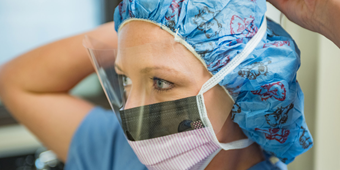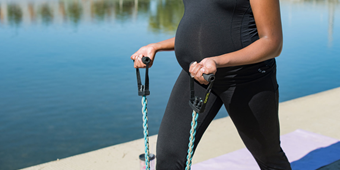Pregnant? Get Help Now for Smoking, Drinking and Drug Use

Find Your Perfect Match
Answer a few questions and we'll provide you with a list of primary care providers that best fit your needs.
Women who smoke, drink alcohol and use opioids like heroin put themselves at risk for multiple health issues, including lung disease, liver disease and the possibility of a dangerous drug overdose. Add a pregnancy to the mix, and moms are at risk for
miscarriage. Their babies may suffer serious birth defects, premature birth and many developmental issues throughout their lives.
If you want to minimize the risk to yourself and your baby during and after a pregnancy, you can make changes now to improve your own health and have a healthy baby, says David McKenna, MD, Perinatal Partners physician.
Smoking and Pregnancy
Smoking during pregnancy is associated with a number of bad outcomes during pregnancy and after the baby is born. Dr. McKenna says it’s important to remember that second-hand and third-hand smoke can also cause an impact. Second-hand smoke is when someone smokes around you and you inhale the smoke. Third-hand smoke refers to the residue or smell of smoke that remains on someone after they’ve smoked.
If you’re pregnant and you breathe in cigarette smoke, you rob your baby of oxygen. This is because the carbon monoxide in cigarette smoke reduces the oxygen level in the blood, says the U.S. Department of Health and Human Service’s Office on Women’s Health. This can lead to:
- Premature birth
- Cleft lip or cleft palate
- Low birth weight
After the baby is born, exposure to cigarette smoke can increase your baby’s risk for Sudden Infant Death Syndrome (SIDS).
The best prevention is to quit smoking. Dr. McKenna says smoking cessation programs are safe and recommended during pregnancy. Many hospitals offer programs or can connect patients to programs provided by the American Cancer Society and the March of Dimes.
“We can safely use medicines and other approaches to help moms quit,” Dr. McKenna says. “It’s hard to quit on your own. Smoking is an addiction, and there needs to be a behavioral component to be successful in breaking the habit.”
Alcohol and Pregnancy
 “Not a drop” is the recommendation today, Dr. McKenna says.
“Not a drop” is the recommendation today, Dr. McKenna says.
Babies are very susceptible to agents or substances that can cause birth defects. In the past, doctors may have thought that one or two drinks are not dangerous, but that thinking has changed. The Office on Women’s Health says there is no safe amount of alcohol a woman can drink while pregnant.
“It is best to avoid all exposure to alcohol because alcohol is known to cause birth defects, growth disturbances and behavioral issues,” Dr. McKenna says.
Alcohol use during pregnancy is the leading cause of preventable birth defects.
Babies exposed to alcohol during fetal development may be born with numerous health issues, says the Eunice Kennedy Shrive National Institute of Child Health and Human Development. Alcohol exposure during fetal development slows the baby’s growth and affects the baby’s brain. Babies exposed to alcohol may be born with:
- Abnormal facial features
- Short stature
- Low body weight
- Hyperactivity disorder
- Hearing and vision problems
- Intellectual disabilities
“If a mother is an alcoholic or has a drinking problem there are resources in the community to help, and she should seek care immediately to prevent damage to the baby,” Dr. McKenna says.
Opioid Use and Pregnancy
If you are using opioids or are addicted to heroin, the best thing you can do for you and your baby is to seek treatment. Opioid use during pregnancy means that drugs taken by a mother pass from her blood stream, through the placenta and into the baby’s blood stream. If mom is addicted, baby will be addicted.
The use of opioids (prescription pain relievers such as oxycodone) and heroin puts a mother at risk of dying of an overdose and makes her pregnancy high risk. The American Congress of Obstetricians and Gynecologists says pregnant women who abuse opioids are more likely to experience:
- Placental abruption
- Growth problems
- Premature birth
- Stillbirth
While most opioids do not cause birth defects, babies exposed to the drug will suffer dangerous withdrawal symptoms at birth, Dr. McKenna says. This is called Neonatal Abstinence Syndrome.
When babies go through withdrawal they can experience:
- Shaking and tremors
- Poor feeding or sucking
- Crying
- Fever
- Diarrhea
- Vomiting
- Sleep problems
Also of concern is that people who use opioids often resort to crime to maintain their habits and are at risk for other health issues such as sexually transmitted infections, HIV and hepatitis C, Dr. McKenna says.
Many of these conditions can be passed to an unborn baby, says the Office on Women’s Health.
“The number of people addicted to opioids right now, which includes pregnant women, is higher than ever,” says Dr. McKenna.
The primary reason behind opioid addiction is that people become addicted to pain medicines prescribed for chronic pain. The availability of inexpensive heroin makes feeding the addiction easier.
Pregnant moms can be effectively treated with medication-assisted therapy (MAT), according to the American Congress of Obstetricians and Gynecologists. MAT treatment:
- Uses a long-lasting opioid such as methadone or buprenorphine
- Reduces cravings
- Removes the euphoric effect of heroin
- Prevents dangerous withdrawal symptoms
- Reduces withdrawal symptoms for a baby exposed to MAT
- Involves drug counseling to help people avoid and prevent a relapse
Community-based programs also provide treatment and assistance to addicted mothers who are pregnant and to babies born addicted.
In the Dayton, Ohio, region, Promise to Hope-Mother to Baby is a program at Miami Valley Hospital that gives free prenatal care and oversees drug treatment for expectant mothers. Promise to Hope assists moms in breastfeeding and being able to go home with their baby instead of the baby facing a potential stay in foster care or with a relative.
Brigid’s Path is a planned Kettering center designed for drug-exposed infants who are born addicted. When it opens in March 2017, Brigid’s Path will allow babies to go through withdrawal in homelike nurseries outside of a hospital setting. Mothers and family members will be allowed to bond with the baby and receive counseling and support.
Take Care of You and Your Unborn Baby
If you smoke, use alcohol or opioids, you can make changes now to improve your health, ensure that you have a safe pregnancy and deliver a healthy baby.
- Talk to your doctor right away.
- Ask for help.
- If you smoke, enroll in a smoking cessation programs.
- If you are addicted to alcohol or drugs, seek substance abuse treatment.
- Treatment programs do work and are safe during pregnancy.
- Eat well and exercise. Proper nutrition and activity can boost your mood and help you feel better overall.
When you seek help for smoking, alcohol and opioid use, you’re taking an important step for you and your baby. Remember to talk with your doctor often about any concerns you may have as your pregnancy progresses.
Find Your Perfect Match
Answer a few questions and we'll provide you with a list of primary care providers that best fit your needs.
Source: David McKenna, MD, Perinatal Partners; American Congress of Obstetricians and Gynecologists; U.S. Department of Health and Human Service’s Office on Women’s Health; National Institutes of Health





